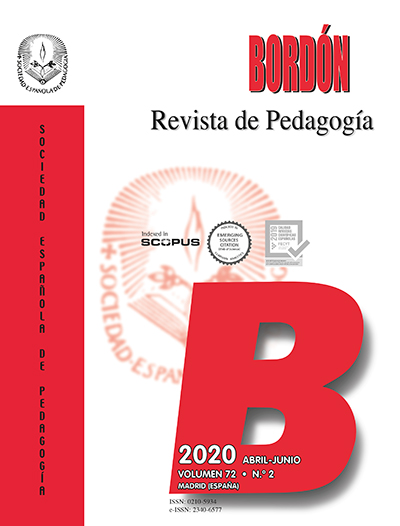L’enseignement bilingue est-il inclusif ? Analyse de la présence et du type d’accompagnement aux élèves ayant des besoins éducatifs particuliers
Contenu principal de l'article
Résumé
Téléchargements
Renseignements sur l'article
Références
○ Arnaiz, P. (2019). La educación inclusiva: mejora escolar y retos para el siglo XXI. Participación Educativa. Revista del Consejo Escolar del Estado, 6(9), 39-52.
○ Azorín, C. y Sandoval, M. (2019). Apoyos para avanzar hacia una educación más inclusiva en los centros escolares: análisis de guías para la acción. Siglo Cero, 50(3), 7-27. doi: http://doi.org/10.14201/scero2019503727
○ Beacco, J. y Byram, M. (2007). Guide for the development of language education policies in Europe: from linguistic diversity to plurilingual education. Estrasburgo: Council of Europe Language Policy Division.
○ Booth, T. y Ainscow, M. (2011). Index for inclusion. Developing learning and participation in schools (3.a ed.). Manchester: CSIE.
○ Cejudo, J., Díaz, M. V., Losada, L. y Pérez González, J. C. (2016). Necesidades de formación de maestro de infantil y primaria en atención a la diversidad. Bordón, 68(3), 23-39. doi: http://doi.org/10.13042/Bordon.2016.68402
○ Cohen, J. (1969). Statistical power analysis for the behavioral sciences. Nueva York: Academic Press.
○ Comisión Europea (2012). CLIL/EMILE. The European dimension. Actions, trends and foresight potential. Bruselas. Recuperado de https://jyx.jyu.fi/dspace/bitstream/handle/123456789/47616/david_marshreport.pdf?sequence%20=1
○ Comisión Europea (2017). Eurydice brief. Key data on teaching languages at school in Europe. Bruselas. Recuperado de https://eacea.ec.europa.eu/erasmus-plus/news/new-eurydice-brief-published-key-data-teaching-languages-school-in-europe-2017-edition_en
○ Echeita, G. (2017). Educación inclusiva. Sonrisas y lágrimas. Aula Abierta, 46, 17-24. doi: http://doi.org/10.17811/rifie.46.2017.17-24
○ Eurydice (2005). Cifras clave de la enseñanza de lenguas en los centros escolares de Europa. Madrid: Eurydice.
○ Fernández, R., Pena, C., García, A. y Halbach, A. (2005). La implantación de proyectos educativos bilingües en la Comunidad de Madrid: las expectativas del profesorado antes de iniciar el proyecto. Porta Linguarum, 3, 161-173.
○ Hornby, G. (2015). Inclusive special education: development of a new theory for the education of children with special educational needs and disabilities. British Journal of Special Education, 42(3), 234-256. doi: http://doi.org/10.1111/1467-8578.12101
○ Jiménez-Martínez, Y. y Mateo, J. M. (2011). Implementación de la educación bilingüe en el sistema educativo español: hacia una educación de calidad europea. Revista de Psicología y Educación, 6, 153-172.
○ Johnson, R. B., Onwuegbuzie, A. J. y Turner, L. A. (2007). Toward a definition of mixed methods research. Journal of Mixed Methods Research, 1(2), 112-133. doi: https://doi.org/10.1177/1558689806298224
○ Jover, G., Fleta, T. y González, R. (2016). La formación inicial de los maestros de educación primaria en el contexto de la enseñanza bilingüe en lengua extranjera. Bordón, 68(2), 121-135. doi: http://doi.org/10.13042/Bordon.2016.68208
○ Laorden, C. y Peñafiel, E. (2010). Proyectos bilingües en los centros de la comunidad autónoma de Madrid: percepción de los equipos directivos. Revista de Investigación Educativa, 28(2), 325-344.
○ Lasagabaster, D. y Ruiz de Zarobe, Y. (eds.) (2010). CLIL in Spain: implementation, results and teacher training. Cambridge: Cambridge Scholars Publishing.
○ Liasidou, A. (2013). Bilingual and special educational needs in inclusive classrooms: some critical and pedagogical considerations. British Journal of Learning Support, 28(1), 11-17. doi: http://doi.org/10.1111/1467-9604.12010
○ Lova, M., Bolarín, M. J. y Porto, M. (2013). Programas bilingües en Educación Primaria: valoraciones de docentes. Porta Linguarum, 20, 253-268.
○ Madrid, D. y Pérez-Cañado, M. L. (2018). Innovations and challenges in attending to diversity through CLIL. Theory into Practice, 57(3), 241-249.
○ Marsh, D. (2012). Content and Language Integrated Learning (CLIL). A development trajectory. Córdoba: Servicio de Publicaciones de la Universidad de Córdoba.
○ Pena, C. y Porto, M. D. (2008). Teacher beliefs in a CLIL education project. Porta Linguarum, 10, 151-161.
○ Pérez-Cañado, M. L. (2019). CLIL and elitism: myth or reality? The Language Learning Journal. doi: http://doi.org/10.1080/09571736.2019.1645872
○ Reindal, S. M. (2016). Discussing inclusive education: an inquiry into different interpretations and a research for ethical aspects of inclusion using the capabilities approach. European Journal of Special Needs Education, 31(1), 1-12. doi: http://doi.org/10.1080/08856257.2015.1087123
○ Travé, G. (2013). Un estudio sobre las representaciones del profesorado de Educación Primaria acerca de la enseñanza bilingüe. Revista de Educación, 361, 1-14. doi: http://doi.org/10.4438/1988-592X-RE-2011-361-149
○ Travé, G. (2014). La enseñanza bilingüe a partir de las representaciones del profesorado: un estudio integrado (tesis inédita de doctorado). Universidad de Huelva, Huelva.
○ UNESCO (2015). Replantear la educación. ¿Hacia un bien común mundial? París: UNESCO.
○ UNESCO (2017). La educación transforma vidas. París: UNESCO.

